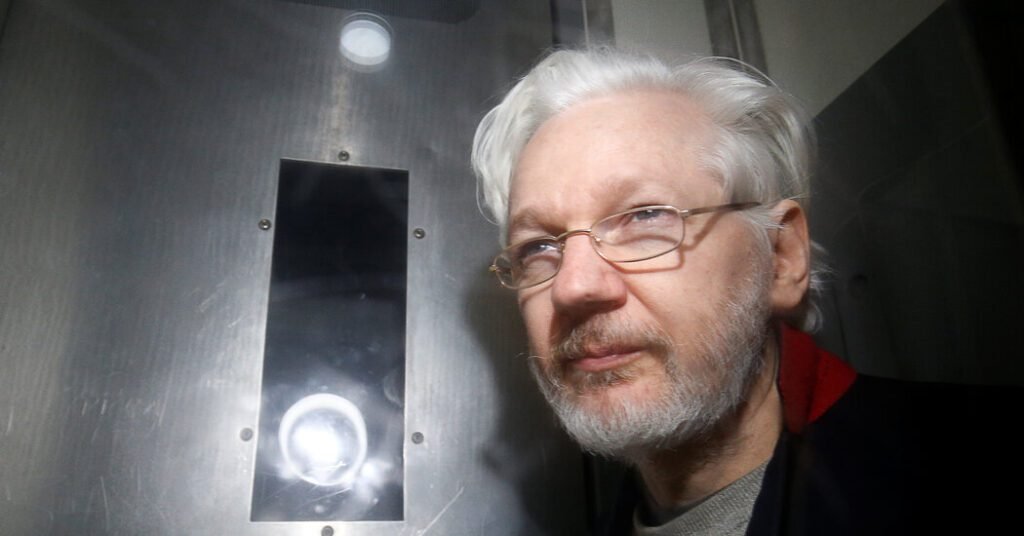As of 2019, Julian Assange, the founder of WikiLeaks, has been held in a maximum security prison in southeast London while his lawyers fight a US extradition order. Now, that particular battle may be drawing to a close.
On Tuesday and Wednesday, Mr Assange’s case returns to a British court for a two-day hearing that will determine whether he has exhausted his right to appeal in the UK and could be a step closer to being sent to the United States States.
In America, Assange, 52, faces charges under the Espionage Act of 1917, which could carry up to 175 years in prison, his lawyers say, although lawyers for the United States government have previously said that it was more likely to be a sentence of four to six years. Here’s what you need to know about the long-running legal battle over his extradition and what could happen next.
Assange has been in a British prison for nearly five years. Here’s why.
The US charges against Mr Assange date back to the events of 2010, when WikiLeaks published tens of thousands of classified military and diplomatic documents leaked by Chelsea Manning, an army intelligence analyst.
The files revealed secret diplomatic dealings and included revelations about civilian deaths in the wars in Iraq and Afghanistan.
In May 2019, during the Trump presidency, the US Department of Justice charged Mr. Assange with violating the Espionage Act by requesting and publishing classified government information, charges that raise deep First Amendment issues. (The Obama administration had considered indicting Mr. Assange, but decided against it because of the threat to press freedom.)
While Mr Assange has for years been pushing for his extradition from Britain to face the US charges, his life in limbo in London goes back even further.
In June 2012, Mr Assange entered the Ecuadorian Embassy in London to avoid extradition to Sweden, where he faced an investigation into unrelated allegations of sexual harassment and rape that were later dismissed. He remained at the embassy for the next seven years.
This hearing is the “beginning of the end” of extradition appeals in UK courts, Assange’s team says.
Mr Assange’s extradition order was initially refused by a British judge, who ruled in January 2021 that Assange risked suicide if sent to a US prison. Britain’s High Court later overturned that decision after assurances from American officials about his treatment. Priti Patel, then British Home Secretary, approved the extradition request in 2022.
But the legal challenges continued. Mr Assange’s legal team had an earlier request to appeal Ms Patel’s order rejected by a single judge. Now, two High Court judges will hear his final bid to appeal to a British court.
Mr Assange’s legal team will present its case on Tuesday, followed by the US Department of Justice’s legal team. The justices will then consider the case — which can take hours, days or weeks — before announcing their decision.
And there are a few possible outcomes. The judges could allow Mr Assange to appeal his extradition order, at which point a full appeal hearing would be scheduled, opening the door to a new decision on his extradition.
Or, if Mr Assange’s appeal is rejected, he could be immediately put on a plane bound for the United States, his legal team said. But his lawyers have vowed to challenge his extradition at the European Court of Human Rights in Strasbourg, France.
In theory, this could block his extradition from Britain until the case is heard in Strasbourg, because Britain is bound to follow the court’s ruling as a signatory to the European Convention on Human Rights.
The process has affected Mr Assange’s health. And rights groups have expressed fears about what will come next.
Stella Assange, Mr Assange’s wife, said during a press briefing last week that her husband, who suffered from depression, had aged prematurely during his years in prison and she feared for his mental and physical health.
“His life is in danger every day he is in prison and if he is extradited, he will die,” he said. The couple, who began a relationship while Mr Assange was living in the Ecuadorian embassy, have two children and regularly visit Mr Assange in prison.
“Julian and I protect the children. They honestly don’t know,” Ms Assange said of the indictment against him. “And I don’t think it’s fair that they know what’s going on.”
Alice Jill Edwards, the United Nations Special Rapporteur on torture, urged Britain to halt Mr Assange’s extradition, citing fears that if extradited he would face treatment amounting to torture or other forms of punishment. In a statement earlier this month, he highlighted the risks that he could face “prolonged solitary confinement, despite his precarious state of mental health, and receive a potentially disproportionate sentence”.
The Australian government has also called for Mr Assange, an Australian citizen, to be sent back to his home country, where its parliament passed a resolution last week calling for his release. Prime Minister Anthony Albanese said he had discussed the matter in a meeting last fall with President Biden, and on Thursday Mr Albanese told the Australian parliament “it is appropriate to express our very strong view that these countries should take this needs to be completed.”
Human rights groups such as Amnesty International and press freedom advocates, including Reporters Without Borders, have long called for the US charges against Mr Assange to be dropped and the extradition order to be lifted.
Rebecca Vincent, the director of international campaigns for Reporters Without Borders, said in a statement before the hearing that the US could reject the extradition request or consider Mr Assange’s time in Belmars prison as extended time.
“None of this is inevitable,” Ms Vincent said in a statement before the hearing. “No one should face such treatment for publishing information in the public interest.”

